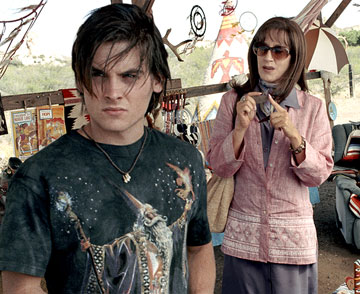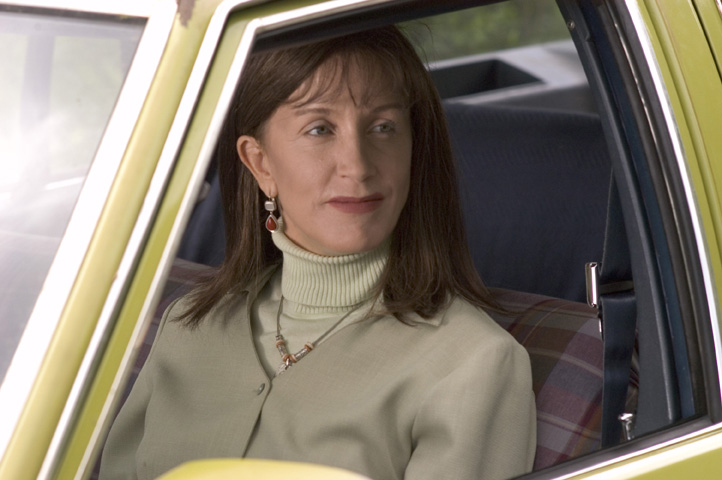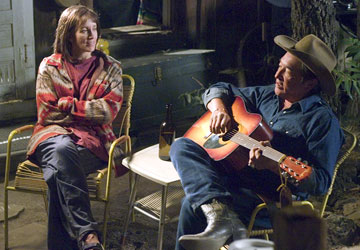By
Brad Balfour
Copyright ©2006 PopEntertainment.com. All rights reserved.
Posted:
March 2, 2006.
Although
Felicity Huffman's name has been before the public through the
high-profile award winning ABC TV series Desperate Housewives,
seeing her in Transamerica is the real shocker. In taking on the
role of a man becoming a woman, Huffman tests her acting skills in ways
the TV show could never possibly do. She handles the adventure that ensues
when her character Bree is suddenly contacted by a son she didn't know she
had weeks before her final operation with remarkable subtlety and
authenticity. Such a controversial role paid off though and she is now
going to the Oscars.
This is a contrast to Desperate Housewives. Did you intend such
an ironic turn...
No there's nothing like that. Desperate Housewives wasn't kicking
off yet. I hadn't even shot the pilot. We weren't sure it had legs. It was
just yet another pilot run up flag pole probably to get shot down.
(laughs)
How did the part first come to your attention?
The script was out there. It was getting a lot of attention. It was a
great script. My agent Chris Anderson said you've got to read it; you've
got to read it. But I never get movie auditions much less movie parts, so
I was just doing it to humor him. And then it was serendipitous that
Duncan [Taylor, the director] saw a couple of off-off Broadway plays I was
in where the audience was 100 people. When he heard that I was really
interested he said yes – wasn’t that amazing!?
What research did you do?
I did a lot. I am so sorry to run down the litany – but I did not know a
lot about the transgendered community; as Andrea James, a wonderful
transgendered woman [who advised us] says. So I read every biography and
autobiography I could get my hands on and watched every documentary I
could. I went to the library and looked through the articles. And I went
to a couple of transgender conventions and met a wide spectrum of the
community.
 Was there long line for the ladies room?
Was there long line for the ladies room?
That's prurient on your part... (laughs) I worked with a woman
named Dinae Doyle who coached men on how to become women; I worked with
Andrea and Calpurnia Adams who helped me go through script and tell what
worked and didn't. And the final linch pin was the voice – not because I
wanted to do it last but because I couldn't figure out how to do it. It
was the last thing to fall into place.
What was involved with getting the voice right?
I had to find the right voice teacher who could to figure it out. I don't
have the chest capacity or the head capacity; I can't get the resonance, I
don't have testosterone. I had to lower about four octaves and then make
it sound like I was stretching for a feminine voice so that it came out as
a lonely haunted, affected voice.
What other things did you do to add to your performance?
A lot of mannerisms like the walk all came from work for two months to
bring all together. Duncan
didn't see it all until I walked on the set. He saw some of the makeup and
whatnot but didn't see it completely until the first day we shot in
village. The voice clicked in a week before shooting.
 What was the hardest point in the film?
What was the hardest point in the film?
The hardest part was probably peeing by side of road. It was weird it was
a prosthetic, just a piece of rubber but when Duncan said we were going to
show Andy, I burst into tears. I was living with Bree so long it was like
a betrayal I did not want the crew see it.
Did you wear your prosthetic most of time?
Pretty much... There were a couple times in Arizona where we in the
station wagon and Andy got a little too hot to wear…
Its name was Andy?
Yeah, Andy. Our costume supervisor had just broken up with a boy and she
was like “My ex boyfriend was named Andy and he was a real dick” and the
name stuck.
Was it odd to have one?
It was really weird. Talking about that moment when I have to pee on side
of road; it does that Brechtian thing of shocking you out of the play and
the same time it takes you back and puts you into Bree's experience. The
way you feel about her penis is the way she's about “oh God” and is
disgusted. That's a wonderful piece of theater.
When you did the nude scene in the bathtub after your operation, must
have been weird to be seen as a woman who had been a man?
There was supposed to be a lot more bubbles but because we we're a little
indie film and everything is a day late and a dollar short. Remember this
was a tiny, tiny indie. We said “oh yeah, there's not enough bubbles.” So
we tried dish detergent and other things but there was not the time to do
something else so I more exposed than anticipated.
 You have gotten nominated for some the
Gotham
Indie film awards. What do you think about that?
You have gotten nominated for some the
Gotham
Indie film awards. What do you think about that?
Who could be blasé about them? I am gun shy about awards. There is no way
to control them. What can you do other than gosh that would be swell. But
if they can come to see this movie it would be a win.
What gave you the confidence in this vehicle?
We didn't know if anyone would even see it. What gave me confidence it
that I got a job you has to learn to trust your director.
Did you talk to your husband [William H. Macy] and call him for advice?
Yeah about how to act every scene! Finally he told me not call in that
voice. It was weird for him. He told me to call at the beginning or end of
the day. We work together really well. Usually it's like trying to play
tennis with a boyfriend, you hate each other by the end of the match. But
we started off working together. He's so brilliant he raises the level of
the game.